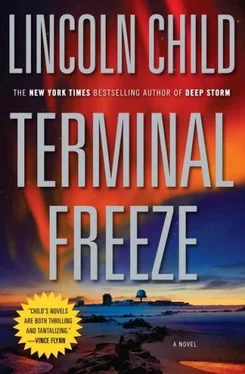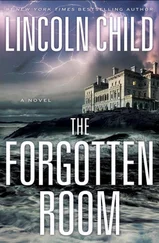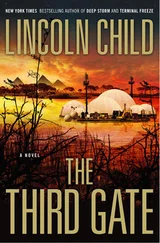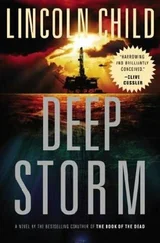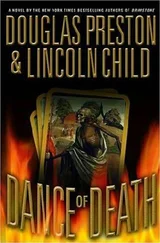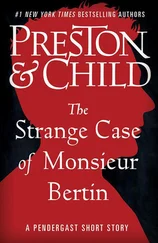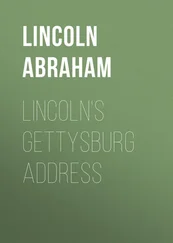“Who’s there?” he called out, the wind snatching away the words as quickly as he uttered them.
He blinked, peered more closely-and then with a piercing shriek of terror tumbled backward, turned, and, half falling, half staggering, fled in the direction of the security station. Screaming and gibbering in sudden mindless fear, Peters made it two more steps before a devastating blow from behind knocked him to his knees, wheezing, eyes bulging-and then a violent, unimaginable pain abruptly blossomed between his shoulder blades. Yawning darkness claimed him for its own.
The physics and life-sciences lab was a converted sheet-metal shop on B Level. It wasn’t really much of a lab, Marshall thought as he stood just inside the doorway, surveying the laptops, microscopes, and other equipment strewn across half a dozen worktables: basically, it was just enough for the most essential day-to-day analysis and observation until they could get their data and samples back to Massachusetts.
In the rear of the lab, Faraday and Chen were huddled over something, backs to him, their heads almost touching. Marshall threaded his way between the tables toward them. As he approached he saw what they were studying so intently: a rack containing a dozen or so small test tubes.
“So this is where you’ve been hiding,” he said.
The two straightened up and turned toward him with the swift, guilty motions of children caught doing something forbidden. Marshall frowned.
“What are you up to?” he asked.
Faraday and Chen exchanged glances.
“Analyzing something,” Faraday said after a moment.
“So I see.” Marshall glanced down at the test tubes. They were filled with different colored liquids: red, blue, pale yellow. “Seems to have captured your full attention.”
Faraday said nothing. Chen shrugged.
“What is it?” Marshall asked bluntly.
In the pause that followed, he looked around the nearby tables, more carefully this time. Faraday’s eight-by-tens of the inside of the vault were scattered across one; they were now covered with circles and arrowed notations in grease pencil. On another table, a plastic bin full of what appeared to be wood chips sat beside a stereo-microscope.
Faraday cleared his throat. “We’re examining the ice.”
Marshall glanced back at him. “What ice?”
“The ice that the cat-the creature-was encased in.”
“How? That ice melted away long ago. And the resulting water would be contaminated, useless as a scientific sample.”
“I know. That’s why I retrieved the samples from the source.”
“The source?” Marshall frowned. “You mean-from the ice cave?”
Faraday pushed his glasses up his nose, nodded.
“You went back to the cave-in this storm? That’s crazy.”
“No, I went last night. After our meeting in the RASP room.”
Marshall folded his arms across his chest. “That’s still crazy. In the middle of the night? That cave’s dangerous enough at the best of times.”
“You sound just like Sully,” Faraday replied.
“There might have been polar bears wandering around.”
“I went along,” Chen said. “With one of the rifles.”
Marshall sighed, leaned back against one of the tables. “Okay. Mind telling me why?”
Faraday blinked at him. “It’s like we discussed at the meeting. Something’s just not right about this.”
“I’ll say. We’ve got a thief in our midst.”
“That’s not what I mean. Things aren’t adding up. The sudden thawing, the creature going missing, the kerf marks…” He pointed at the plastic bin beside the microscope. “I took some samples from around the edges of the vault hole and examined them at 40x. There’s no question about it: those marks were made from the inside out, not from somebody sawing in from underneath.”
Marshall nodded. “A minute ago you said I sounded like Sully. What did you mean by that?”
“When he heard I went up to the cave, Sully went ballistic. He said it was a waste of time, that I might as well throw the samples away.”
Marshall didn’t reply immediately. He recalled how dismissive Sully had been about this theory-and about the photographs in general. While Faraday might have been foolhardy to collect the samples in the first place, it seemed a scientific given that, once obtained, they should be analyzed. He thought again of what Conti had said about Sully.
Chen glanced at Faraday, then nodded toward the wood samples. “Tell him the other thing.”
Faraday smoothed the front of his lab coat. “When we examined the chips under the microscope, we also found samples of matted hair and a good amount of dried, dark matter caked to the sharper edges.”
“Caked?” Marshall repeated. “Was it blood?”
“I haven’t analyzed it yet,” Faraday said. He opened his mouth, then shut it again, as if thinking better of the idea.
“Go ahead,” Marshall said. “Tell me the rest.”
Faraday swallowed. “Those kerf marks…” he began. “I don’t know. Under the scope they don’t look like they were made by a saw.”
“What, then?”
“They appear to have been more…natural in origin.”
Marshall looked from Faraday to Chen and back again. “Natural? I’m not following.”
This time it was Chen who spoke. “Not sawed through. More like chewed through.”
The silence that followed this was much longer.
“How on earth can you expect me to believe that, Wright?” Marshall asked at last, trying to keep his voice from betraying his deep skepticism.
Faraday cleared his throat again. “Listen,” he said, his voice lower. “When I know something for a fact- if I know something-I’ll tell you. I won’t hold it back. I just don’t want any more flak from Sully.”
“Sully,” Marshall repeated thoughtfully. “You know where he is?”
“Haven’t seen him for hours.”
“Okay.” Marshall eased himself away from the table. “If you learn anything, you’ll let me know?”
Faraday nodded. With a final, searching look at the two men, Marshall turned and slowly made his way out of the lab.
Jeremy Logan ventured carefully along the narrow corridors of E Level. It had taken him almost ninety minutes of exploring to reach this, the lowest level of Fear Base’s central section. As he’d penetrated deeper into the base, he’d found the passages cluttered with increasing amounts of shadowy detritus: desks piled atop one another, tools, pieces of ancient electrical equipment, decaying boxes filled with vacuum tubes. It was as if all the unused clutter of the base had literally sunk to the bottom over the years.
C Level had been primarily comprised of support services for the men originally stationed at the base: food-preparation areas, laundry, tailoring. D Level held the quartermaster’s office and countless storage spaces, along with several repair bays. Unlike the suffocatingly warm upper levels, the chill down here was pronounced. The unpleasant smell of the base-inescapable even on the upper levels-was significantly worse. Logan wrinkled his nose at the musky odor.
E Level was a jumbled mélange of secondary spaces and mechanical systems. The ceilings were even lower here than elsewhere, and heavily veined with pipes and cabling. Most lightbulbs had been removed from their fixtures, and those that remained no longer worked. Logan moved slowly from room to room, his flashlight licking right and left, right and left. Many of the objects were covered with old tarps, well preserved in the cold dry air. He wondered when someone had last been this deep inside the base. It was like stepping into a time capsule.
He stopped in what appeared to be an auxiliary control room, a fallback in case the primary systems upstairs became inoperative. The black screens of the monitors and oscilloscopes winked back as his light passed over them. The silence was complete. On a whim, he switched off the flashlight. Instantly, unrelieved blackness engulfed him. He hurriedly switched the light back on. He moved out of the control room and down the corridor, wishing he’d brought along some spare batteries, or preferably a spare flashlight: it wouldn’t do for the one he was using to fail.
Читать дальше
